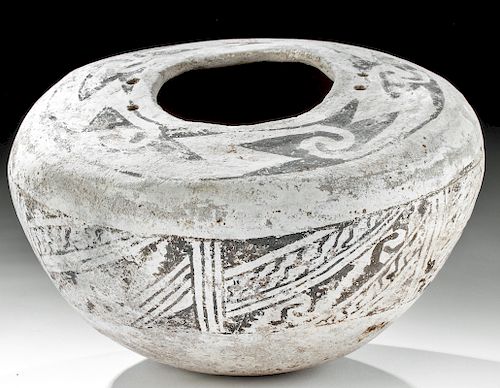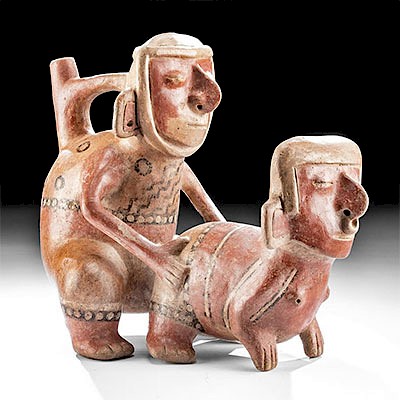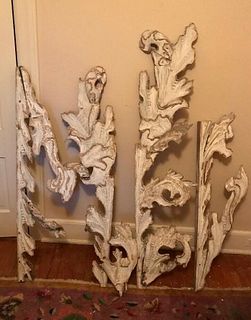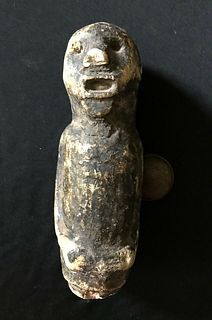Anasazi Puerco Black-on-White Pottery Seed Jar
Lot 63p
About Seller
Artemis Fine Arts
686 S Taylor Ave, Ste 106
Louisville, CO 80027
United States
Selling antiquities, ancient and ethnographic art online since 1993, Artemis Gallery specializes in Classical Antiquities (Egyptian, Greek, Roman, Near Eastern), Asian, Pre-Columbian, African / Tribal / Oceanographic art. Our extensive inventory includes pottery, stone, metal, wood, glass and textil...Read more
Estimate:
$1,000 - $1,500
Absentee vs Live bid
Two ways to bid:
- Leave a max absentee bid and the platform will bid on your behalf up to your maximum bid during the live auction.
- Bid live during the auction and your bids will be submitted real-time to the auctioneer.
Bid Increments
| Price | Bid Increment |
|---|---|
| $0 | $25 |
| $300 | $50 |
| $1,000 | $100 |
| $2,000 | $250 |
| $5,000 | $500 |
| $10,000 | $1,000 |
| $20,000 | $2,500 |
| $50,000 | $5,000 |
| $100,000 | $10,000 |
| $200,000 | $20,000 |
About Auction
By Artemis Fine Arts
Jan 30, 2020
Set Reminder
2020-01-30 10:00:00
2020-01-30 10:00:00
America/New_York
Bidsquare
Bidsquare : Pre-Columbian | Tribal | Ethnographic
https://www.bidsquare.com/auctions/artemis-gallery/pre-columbian-tribal-ethnographic-4830
Featuring ancient and ethnographic art from around the world, including Pre-Columbian, Native American, African / Tribal, Oceanic, Ethnographic, Spanish Colonial, Fossils, Fine Art, much more. Artemis Fine Arts info@artemisfinearts.com
Featuring ancient and ethnographic art from around the world, including Pre-Columbian, Native American, African / Tribal, Oceanic, Ethnographic, Spanish Colonial, Fossils, Fine Art, much more. Artemis Fine Arts info@artemisfinearts.com
- Lot Description
Native American, Southwestern USA, Ancestral Pueblo/Anasazi culture, eastern Arizona, ca. 1050 to 1225 CE. A beautiful, well-preserved ceramic seed jar, of the style known as Puerco black-on-white, its surface painted with a sure, steady hand to create a detailed motif around the broad body and another around the narrow mouth. The strip around the body is a series of repeated steps and serpent-like figures. These may be designed to evoke the shapes of the southwestern landscape and its wildlife. Around the unpronounced rim, triangles, zig-zags, and swirls create another beautiful motif. The mouth is pierced in four places for suspension, as is one upper side. Size: 7.4" W x 4.6" H (18.8 cm x 11.7 cm)
Seed jars were originally made to protect seeds from pests and extreme temperature fluctuations. Most, like this one, were ritually broken at the end of their useful lives. Puerco black-on-white is distinguished by its style of so beautifully on display here in the band around the body, as well as wide, paneled bands of decoration, again as seen here. The area of distribution for this type of pottery is the lower valley of the Rio Puerco and Rio San Jose, including the Rio Salado and Acoma province. It was made by women in the area for a very long period of time.
Provenance: private New Jersey, USA collection; ex-Mark Brady collection, Witches Wells Ranch, Sanders, Arizona, USA
All items legal to buy/sell under U.S. Statute covering cultural patrimony Code 2600, CHAPTER 14, and are guaranteed to be as described or your money back.
A Certificate of Authenticity will accompany all winning bids.
We ship worldwide and handle all shipping in-house for your convenience.
#152546The jar has been repaired from several different pieces. This is generally well done and unobtrusive with a few tiny losses around the repair lines. There is no overpaint or restoration; all pigment is original. Wear on surface commensurate with age and handling including losses to pigment as shown. Nice deposits on surface.Condition
- Shipping Info
-
All shipping is handled in-house for your convenience. Your invoice from Artemis Gallery will include shipping calculation instructions. If in doubt, please inquire BEFORE bidding for estimated shipping costs for individual items.
-
- Buyer's Premium



 EUR
EUR CAD
CAD AUD
AUD GBP
GBP MXN
MXN HKD
HKD CNY
CNY MYR
MYR SEK
SEK SGD
SGD CHF
CHF THB
THB















